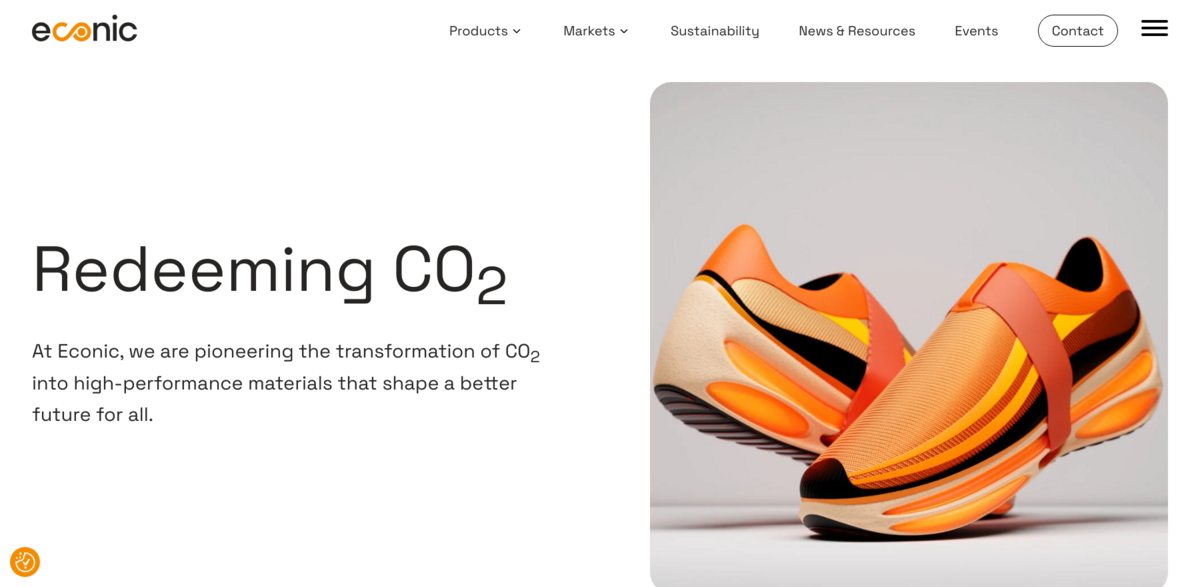What the Project Is About
REDEEMING CO2 – AT ECONIC, THE REVOLUTION IN TRANSFORMING CO2 INTO HIGH-PERFORMANCE MATERIALS IS UNDERWAY. The project focuses on using a patented process based on a unique catalyst that replaces fossil-based raw materials with renewable carbon. This breakthrough technology not only transforms waste CO2 into valuable materials but also shapes a better future for all. It is all about turning carbon emissions into ingredients that make everyday products work better and cost less – think cars, clothes, construction materials, mattresses, and more – ensuring billions of people enjoy modern life with a reduced environmental impact…
Main Benefits for Manufacturers and Brands
The process boasts several key benefits which are listed below:
- Transform waste CO2 into valuable materials
- Reduce carbon footprint up to 30%
- Easily incorporate into existing supply chains
- Energy-efficient process that is cost-competitive with incumbent technologies
- Improved product performance versus existing systems
Innovative Technology and Process
At the heart of the project is the unique catalyst and proprietary process that Econic employs. This technology is not just revolutionary, it is a testament to innovative thinking. The approach takes waste carbon dioxide and turns it around – quite literally – into high-performance ingredients using renewable carbon as the backbone. The method leverages a carefully designed catalyst, allowing the conversion to be both energy efficient and cost competitive, with conditions mirroring those of standard production. This means that existing manufacturing setups can often integrate the process with only minor adaptations, making the innovation accessible to a wide range of industries…
Integration and Supply Chain Advantages
Another compelling aspect of the technology lies in its upside for manufacturers and brands. The flexible process allows for a range of functionalities, molecular weights, and CO2 levels. Manufacturers can benefit by delivering products that feature renewable feedstocks which have performance that is equal to or even better than traditional oil-based materials. Because the process operates at temperatures and pressures similar to standard production, energy costs remain consistent. Existing assets can be utilized with minor changes to the process, ensuring that integration into current supply chains is smooth and cost-efficient. Manufacturers are thus given the perfect opportunity to innovate without overhauling existing infrastructure…
Applications and Everyday Impact
The transformation of CO2 into polyols, surfactants, and other valuable materials has clear real-world applications. The process is designed to pave the way for everyday products that consumers value. Imagine cars that perform better, clothes that last longer, construction materials that are both durable and sustainable, mattresses with less environmental impact, and so much more – all benefiting from renewable carbon. This technology is about producing high-performance products that not only meet consumer needs but also help reduce fossil fuel dependence. It is a step towards a more sustainable future, where products work better and are kinder to the planet…
Project Impact and Sustainable Development Goals
- SDG 7: Affordable and Clean Energy
- SDG 9: Industry, Innovation, and Infrastructure
- SDG 12: Responsible Consumption and Production
- SDG 13: Climate Action
Future Outlook and Market Advantages
The overall vision of the project extends far beyond merely transforming CO2. By licensing this innovative technology to polyols and surfactants manufacturers – who supply some of the world’s most iconic consumer brands – the project is setting the stage for a market transformation. Manufacturers and brand owners receive new environmental claims for their products, allowing them to stand out in a competitive market. The process offers not just environmental advantages but also benefits in product performance and production efficiency. Those interested in exploring and incorporating renewable carbon into their supply chains have the opportunity to experience samples of polyols made with the Econic process. This sample initiative presents an exciting opening to witness firsthand how seamlessly a manufacturing process can pivot towards a more sustainable future without compromising energy costs or operational consistency. As the future unfolds, this technology is set to continue driving innovations that make everyday products work better, reduce environmental impact, and provide tangible competitive advantages in an increasingly eco-conscious market.





















